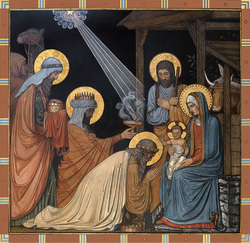
Herod seeks to be a star
The original meaning of “Epiphany” is “to shine upon,” thus to point out, to shine a spotlight on something. The star shines a spotlight on the baby in Bethlehem. That’s why our Christmas trees are still up—they will come down tomorrow. In the Catholic Church, Christmas does not end until after Epiphany.
The Wise Men follow the Christmas Star to Jesus. They were “overjoyed” at seeing the star, because it shone on a divine child, which they knew was their redeemer. But King Herod also sees that star. What does it mean to him? Nothing. It means absolutely nothing to King Herod. First, a bit about Herod. He considered himself a rising star in the Roman Empire—he became governor of Galilee at age 25, kind of like a college kid becoming governor of California. To consolidate his power, he banished his first wife and their son, murdered hundreds of priests, officials, and finally even his second wife and children. He spent his lif seeking to be a star rather than to follow a star. For the next 12 months, until the presidential election in November, America will be consumed with political news, who is a rising star and who is a sinking star? Who is in, and who is out? But really, there is only one Star that gives light. The rest of us rejoice to see that star, and to reflect its light.
Wise Men follow a star
While Herod glues his attention to dirty, earthly politics, the Wise Men study the skies. They look up, while Herod looks down. They are following another star. They’ve left everything; they’ve set out on a long and perilous journey, to find this star. When they arrive in Jerusalem to find the newborn “king of the Jews,” Herod panics. “Hey, I am the king of the Jews. I fought long and hard to gain that title.” And so he reacts fanatically to keep control—he murders all the boys two and under in Bethlehem. The Magi and Herod go clean past each other in Jerusalem: Herod toward hell, the Magi toward heaven. They are ships passing in the night, on opposite voyages, with opposite destinations.
Kneeling before the Child
How is it that Herod missed the ineffable joy of the baby Jesus? He’s like the scrooge—saw nothing in Christmas but a problem. To him, the baby was just a brat, another poor Jew born to homeless parents. But the Magi see the baby for what he really is—a king, the King of Kings and Lord of Lords. They kneel before Him; they submit their human kingship to his divine Kingship. Imagine if every political ruler, every movie star and sports idol, would kneel before God. You know what happens when one does—Denver Broncos starting quarterback Tim Tebow, for example. People go crazy, just like Herod. Submission to God offends the world, because it threatens the world. St. Paul calls this “stewardship” in our second reading. “You have heard of the stewardship of God’s grace that was given to me for your benefit.” All that we have, and all that we are, is God’s. Unto him, render it back. So did the Magi, so must we, to have true joy.
Prayer: getting out of ourselves and seeing God in everything
Why didn’t Herod rejoice when he saw the Star? Because he was imprisoned inside himself. To see the beauty of the Star, we need to get out of ourselves, and it is prayer that leads us out of that prison. Prayer is listening to God, rather than listening to ourselves. Spend time in quiet relationship with God, and all your other relationships will be OK. Mother Teresa used to say: “if your prayer life is all right, your charitable life will be perfectly all right.” No one wants to be a Herod, not even Herod. No one wants to kill babies, or their own wife and sons. But unless we study the heavens like the Magi, we will sink with him. Prayer enlarges the heart and makes it capable of receiving the infinite God. Take the trouble to pray, to look up instead of down, to seek and expect joy. Then we will begin to see God in everything and everyone—even in our frustrations, irritations and misunderstandings. Our faith in God will grow, as will our conviction that everything happens for a reason, God’s reason.


 RSS Feed
RSS Feed